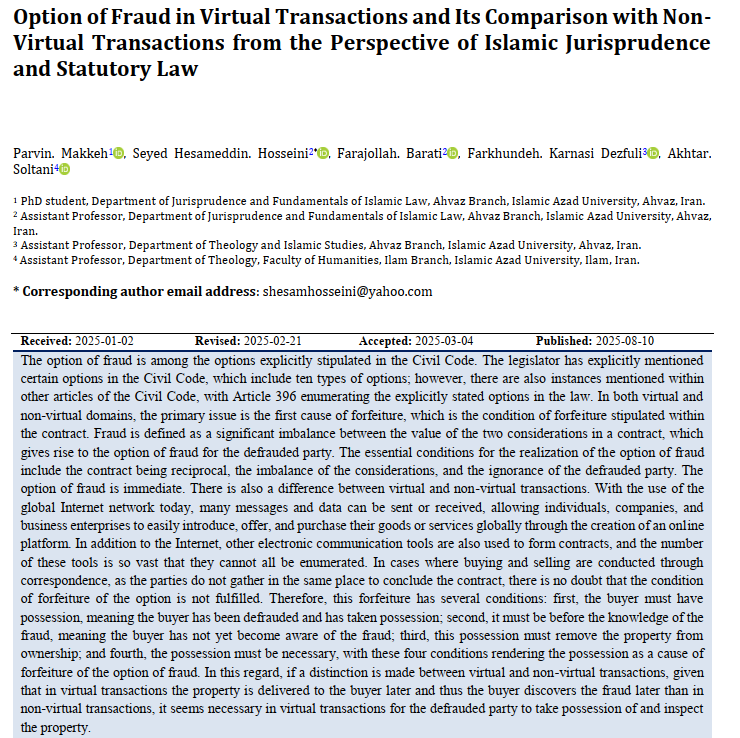Option of Fraud in Virtual Transactions and Its Comparison with Non-Virtual Transactions from the Perspective of Islamic Jurisprudence and Statutory Law
Keywords:
Option of fraud, transaction, virtual, non-virtual, Islamic jurisprudence, statutory law.Abstract
The option of fraud is among the options explicitly stipulated in the Civil Code. The legislator has explicitly mentioned certain options in the Civil Code, which include ten types of options; however, there are also instances mentioned within other articles of the Civil Code, with Article 396 enumerating the explicitly stated options in the law. In both virtual and non-virtual domains, the primary issue is the first cause of forfeiture, which is the condition of forfeiture stipulated within the contract. Fraud is defined as a significant imbalance between the value of the two considerations in a contract, which gives rise to the option of fraud for the defrauded party. The essential conditions for the realization of the option of fraud include the contract being reciprocal, the imbalance of the considerations, and the ignorance of the defrauded party. The option of fraud is immediate. There is also a difference between virtual and non-virtual transactions. With the use of the global Internet network today, many messages and data can be sent or received, allowing individuals, companies, and business enterprises to easily introduce, offer, and purchase their goods or services globally through the creation of an online platform. In addition to the Internet, other electronic communication tools are also used to form contracts, and the number of these tools is so vast that they cannot all be enumerated. In cases where buying and selling are conducted through correspondence, as the parties do not gather in the same place to conclude the contract, there is no doubt that the condition of forfeiture of the option is not fulfilled. Therefore, this forfeiture has several conditions: first, the buyer must have possession, meaning the buyer has been defrauded and has taken possession; second, it must be before the knowledge of the fraud, meaning the buyer has not yet become aware of the fraud; third, this possession must remove the property from ownership; and fourth, the possession must be necessary, with these four conditions rendering the possession as a cause of forfeiture of the option of fraud. In this regard, if a distinction is made between virtual and non-virtual transactions, given that in virtual transactions the property is delivered to the buyer later and thus the buyer discovers the fraud later than in non-virtual transactions, it seems necessary in virtual transactions for the defrauded party to take possession of and inspect the property.
Downloads
References
Amid, H. (1996). Amid Dictionary. Tehran: Amir Kabir Publications.
Amiri Qayem-Maqami, A. (2006). Law of obligations: General theory of civil obligations. Tehran: University of Tehran.
Emami, H. (2019). Civil rights. Tehran: Mizan Publications.
Fakhari Tusi, J. (2006). In the presence of Sheikh Ansari: Commentary on options (Vol. 5th ed., Vol. 3). Qom: Morteza Publications.
Haeri, S. A. (2023). Commentary on the Civil Code. Tehran: Ganj Danesh Publications.
Helli, A. (2001). Tahrir al-Ahkam al-Shar'iyya according to the Imamiyah school (Vol. 1st ed.). Qom, Iran: Imam Sadiq Institute.
Jafari Chermehini, E. (2017). The application of options in electronic sales in Iran. In Annual Conference on Legal and Judicial Research,
Katouzian, N. (2024). Civil law in the current legal order. Tehran: Mizan Publications.
Maqami Nia, M. (2012). The formation of electronic contracts and their characteristics. Journal of Civil Law Knowledge, 1, 13-34.
Mohammad ibn Hasan Hilli. (2006). Izaah al-Fawa'id. Qom, Iran: Imam Sadiq Institute.
Najafi, M. H. (1995). Jawahir al-Kalam fi Sharh Sharai' al-Islam (Vol. 7th ed.). Beirut, Lebanon: Dar Ihya al-Turath al-Arabi.
Rezai, A. (2014). Electronic commerce law (Vol. 24). Mizan Legal Publications.
Shahid Thani. Al-Rawdah al-Bahiyyah fi Sharh al-Lam'ah al-Dimashqiyyah (Vol. 3). Beirut.

Downloads
Additional Files
Published
Submitted
Revised
Accepted
Issue
Section
License
Copyright (c) 2025 Parvin Makkeh, Seyed Hesameddin Hosseini, Farajollah Barati, Farkhundeh Karnasi Dezfuli, Akhtar Soltani (Author)

This work is licensed under a Creative Commons Attribution-NonCommercial 4.0 International License.





